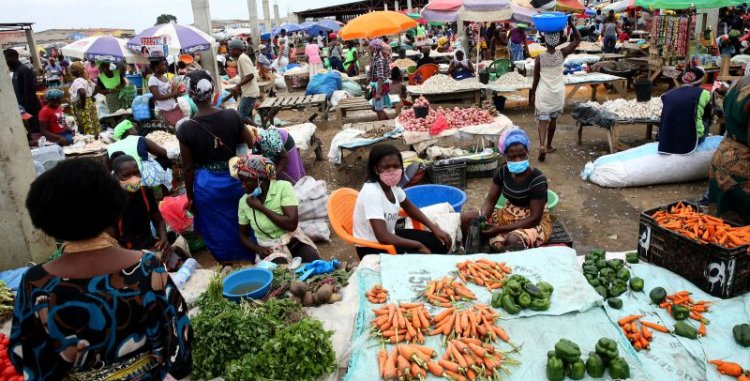Sellers in that supply market, especially of agricultural products, in the municipality of Viana, in Luanda, complain that the demand for the goods they sell has decreased by half and their profits have proportionally fallen.
A variety of products, from basic food baskets, vegetables, fruits, fish, slaughtered meat and others, are sold at the Mercado do 30, 30 kilometers from Luanda, but the current prices are hindering the adhesion of buyers.
For Lintánia Bula, fruit seller, covid-19 has direct implications for current market prices. The trader described that her profits have dropped from up to 70,000 kwanzas/day to 5000 kwanzas currently.
In Mercado do 30 for five years, Lintánia, 25 years old, says she is "outraged" with her current income, which is restricted to buying essentials for her children at home, because currently "things are difficult, commerce is no longer it is profitable and there is no saving".
"Especially for us who sell fruit, because the longer it takes, the more it rots and the more money you have wasted, so it's not easy," she lamented.
Constantina Juvala has her "breadwinner" in the sale of cabbages, an exercise that has lasted for three years, but in the last two years, she says, she has faced several difficulties in supporting herself and her children, for the same reason: the high prices of products and the consequent low demand.
A cabbage in that market is being traded for between 400 kwanza and 500 kwanza, but he says he counts with his fingers the number of customers who buy daily and, when they appear, "they still complain to lower the price".
"And so it's complicated, and a day we can take 2000 kwanzas of profit," she shot her.
The high price of a kilogram of rice, cornmeal and beans was pointed out with concern by Faustina Alberto Quintas, who in Mercado do 30 sells plastic utensils, whose prices have also increased considerably.
The seller confirms the reduced demand for the products: "Things are very expensive and many customers have reduced expenses to get only the essentials".
"And life is really bad, for the day we're getting really little, and we're not taking anything home," said the 32-year-old saleswoman.
One of the customers who join the Mercado do 30 in search of products for consumption or for resale, Júlia Diogo, an ice cream seller at home, who says that only some products from the countryside still have "affordable" prices.
Accompanied by a young man, who was carrying the products he had purchased in a wheelbarrow, among sacks of mucua, tomatoes and others, Júlia Diogo told Lusa that she spent 36,000 kwanzas, also confirming the "pull prices" for rice, oil, chicken and fish.
"When reselling it pays, yes, I'm always here at the [market of] 30, but prices soared during this period of covid-19. For example, in warehouses the bag of rice would have to reach at least 5000 kwanzas because people don't earn almost nothing," he stressed.
The Government is developing several actions to reduce the price of goods in the basic basket, namely the tax exemption on some products and the reduction of the Value Added Tax (VAT) from 14 to seven percent.
Lintánia Bula also referred that the Government's measures "have no impact" on the prices currently practiced in the 30's Market, asking the authorities to "change the direction of the situation with effective measures to improve living conditions".
"That's why we asked the Government for help to reduce the price of things and that way we'll manage to survive and be able to know how to take care of our children", concluded the fruit seller.







